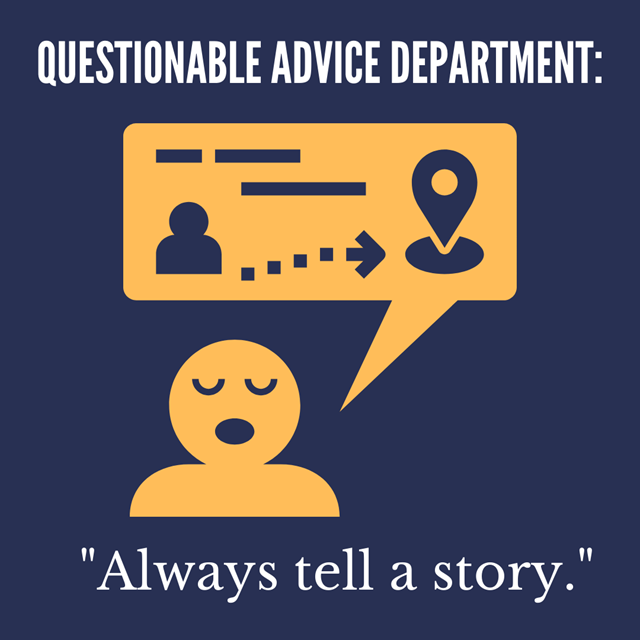
"Whoever Tells the Best Story Wins"
– Title of a popular business book
If you've read anything in the last ten years about the art of making presentations, you're bound to have heard the recommendation: Tell a story.
There's a good reason for that. Stories have a lot going for them, which you've probably heard all about:
- They tend to make information easier to understand, recall, and repeat.
- They push the speaker toward using more conversational language and concrete details.
- They appeal to our hearts, as well as our heads.
So why do we question advice that a speaker always tell a story? A few reasons, based on our experience and, well, some of the stories our clients have told us.
Before you launch into a yarn in a critical speech or presentation, give a thought to these factors.
1. Consider whether you might have a story-averse audience.
What, you say? There are people who don't embrace stories? Who could these grim souls be?
These "grim" souls are sensible, analytical thinkers who embrace data, for one. Engineers. Scientists. No-nonsense members of the military. When they hear a story, they tend to be skeptical. "Is this just one instance that defies the trend?" they'll ask. Anyone, they'll tell you, can find one example to make a point.
If you suspect you have a story-averse audience on your hands, you might want to use fewer stories. Or you might want to present the data and use a story to show how it applies. Just don't make the mistake of thinking a story will be enough.
2. Evaluate the situation and apply some common sense.
We find it hard to believe we need to say this, but there are times when a story is not appropriate—you're closing down a location and laying off staff, for example, or you're telling the boss you missed budget.
Yet, we have encountered people who’ve told stories in such situations and felt the pain of doing so.
3. Be sure the story makes your point—and if not, leave it out.
Effective stories for business presentations are different from the stories we tell with friends and family around the dinner table. Presentation stories need to have a clear purpose and point, one the audience will get. And it's better to make these stories shorter rather than longer.
So if your story must be long in order to be told well, you might want to reconsider. And you must be firm with yourself. Raise your right hand and swear: I will not tell a story just because I like it.
As one friend of the school always says, a way to test your story’s fitness for your presentation is to fill in the blank on this sentence:
I’m telling you this story because _____________.
If you don’t know or like your answer, reconsider. And be sure that when your audience fills in the same blank, their answer will match yours.
For more on storytelling in presentations:
We're fans of this book, which is not about making presentations but considers what makes stories effective.
Here are tips from one Buckley faculty member on how to develop more interesting stories.
If you've ever heard the old advice "show don't tell," here's how to apply that to your stories.






